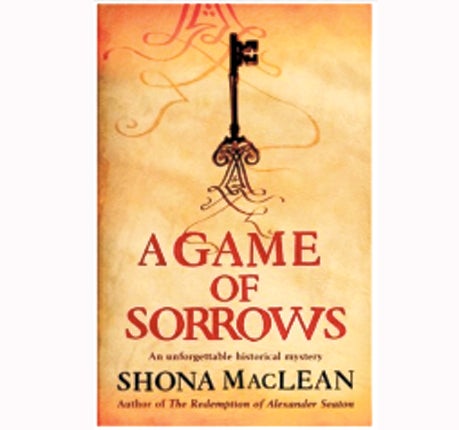A Game of Sorrows, By Shona MacLean
Celtic quest has mystery appeal

In these straitened times, at least one welcome trend is warming the cockles of booksellers' hearts: the revival of the popular historical novel.
The astonishing success of Hilary Mantel's Wolf Hall has rekindled readers' taste for vivid period fiction, but such writers as C J Sansom had been paving the way. If your taste is for such fare, you would be wise to pick up Shona MacLean's A Game of Sorrows, a diverting historical mystery that combines the ironclad plotting of Sansom with the artful recreation of Mantel.
MacLean's protagonist is once again the eponymous hero of her The Redemption of Alexander Seaton, much praised for its atmospheric evocation of Scotland in the 1620s. Seaton is a disgraced cleric whose love affairs have cost him his job. He undergoes a double journey, involving the uncovering of a murderer and the regaining of his faith.
It is 1628, and Seaton has a new life as a university teacher in Aberdeen. A stranger arrives – an emissary from his family in Ireland. Seaton listens in amazement as he is told that his clan has been placed under a poet's curse. His relatives are to die, one by one, and the curse is (apparently) already claiming victims. Against his will, Seaton returns to Ulster and finds himself embroiled in bitter internecine squabbles. As he attempts to track down the curser, he quickly finds that his own life is in just as much danger as his benighted relatives'.
The Game of Sorrows makes stimulating company for a trip to 17th-century Carrickfergus. The Celtic atmosphere has striking pungency, and Seaton is a nicely idiosyncratic protagonist. His sometimes anachronistic 20th-century mindset is balanced against the prejudices of his time – he is prone to judge people by their religion, rather as Umberto Eco gave his otherwise modern-minded sleuth in The Name of the Rose some negative medieval views on women. Although the brio of the earlier book is more fitfully evident here, MacLean once again demonstrates that she is a distinctive talent.
Subscribe to Independent Premium to bookmark this article
Want to bookmark your favourite articles and stories to read or reference later? Start your Independent Premium subscription today.

Join our commenting forum
Join thought-provoking conversations, follow other Independent readers and see their replies